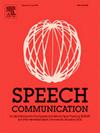The combined effects of bilingualism and musicianship on listeners’ perception of non-native lexical tones
IF 2.4
3区 计算机科学
Q2 ACOUSTICS
引用次数: 0
Abstract
Non-native lexical tone perception can be affected by listeners’ musical or linguistic experience, but it remains unclear of whether there will be combined effects and how these impacts will be modulated by different types of non-native tones. This study adopted an orthogonal design with four participant groups, namely, Mandarin-L1 monolinguals and Mandarin-L1 and Cantonese-L2 bilinguals with or without musical training, to investigate effects of bilingualism and musicianship on perception of non-native lexical tones. The closely matched four groups, each encompassing an equal number of 20 participants, attended a modified ABX discrimination task of lexical tones of Teochew, which was unknown to all participants and consists of multiple tone types of level tones, contour tones, and checked tones. The tone perceptual sensitivity index of d’ values and response times were calculated and compared using linear mixed-effects models. Results on tone sensitivity and response time revealed that all groups were more sensitive to contour tones than level tones, indicating the effect of native phonology of Mandarin tones on non-native tone perception. Besides, as compared to monolinguals, bilinguals obtained a higher d’ value when discriminating non-native tones, and musically trained bilinguals responded faster than their non-musician peers. It indicates that bilinguals enjoy a perceptual advantage in non-native tone perception, with musicianship further enhancing this advantage. This extends prior studies by showing that an L2 with a more intricate tone inventory than L1 could facilitate listeners’ non-native tone perception. The pedagogical implications were discussed.
双语和音乐性对听者感知非母语词调的综合影响
听者的音乐或语言经验可能会影响非母语词汇音调感知,但是否会产生综合影响以及不同类型的非母语音调会如何调节这些影响,目前仍不清楚。本研究采用正交设计,将普通话-L1 单语听者、普通话-L1 和粤语-L2 双语听者(无论是否接受过音乐训练)分为四组,研究双语能力和音乐素养对非母语词调感知的影响。四组人数相等的20名受试者参加了潮州话词性声调的改良ABX辨别任务,所有受试者都不知道潮州话词性声调包括平调、轮廓调和检查调等多种声调类型。采用线性混合效应模型计算并比较了音调知觉敏感度指数 d'值和反应时间。音调敏感度和反应时间的结果表明,各组对等高线音调的敏感度均高于平舌音,这表明普通话音调的母语语音对非母语音调感知有影响。此外,与单语者相比,双语者在辨别非母语声调时获得了更高的d'值,而且受过音乐训练的双语者比非音乐家的同龄人反应更快。这表明,双语者在非母语音调感知方面享有感知优势,而音乐训练则进一步增强了这种优势。这扩展了之前的研究,表明与第一语言相比,第二语言具有更复杂的音调库,可以促进听者对非母语音调的感知。研究还讨论了其教学意义。
本文章由计算机程序翻译,如有差异,请以英文原文为准。
求助全文
约1分钟内获得全文
求助全文
来源期刊

Speech Communication
工程技术-计算机:跨学科应用
CiteScore
6.80
自引率
6.20%
发文量
94
审稿时长
19.2 weeks
期刊介绍:
Speech Communication is an interdisciplinary journal whose primary objective is to fulfil the need for the rapid dissemination and thorough discussion of basic and applied research results.
The journal''s primary objectives are:
• to present a forum for the advancement of human and human-machine speech communication science;
• to stimulate cross-fertilization between different fields of this domain;
• to contribute towards the rapid and wide diffusion of scientifically sound contributions in this domain.
 求助内容:
求助内容: 应助结果提醒方式:
应助结果提醒方式:


